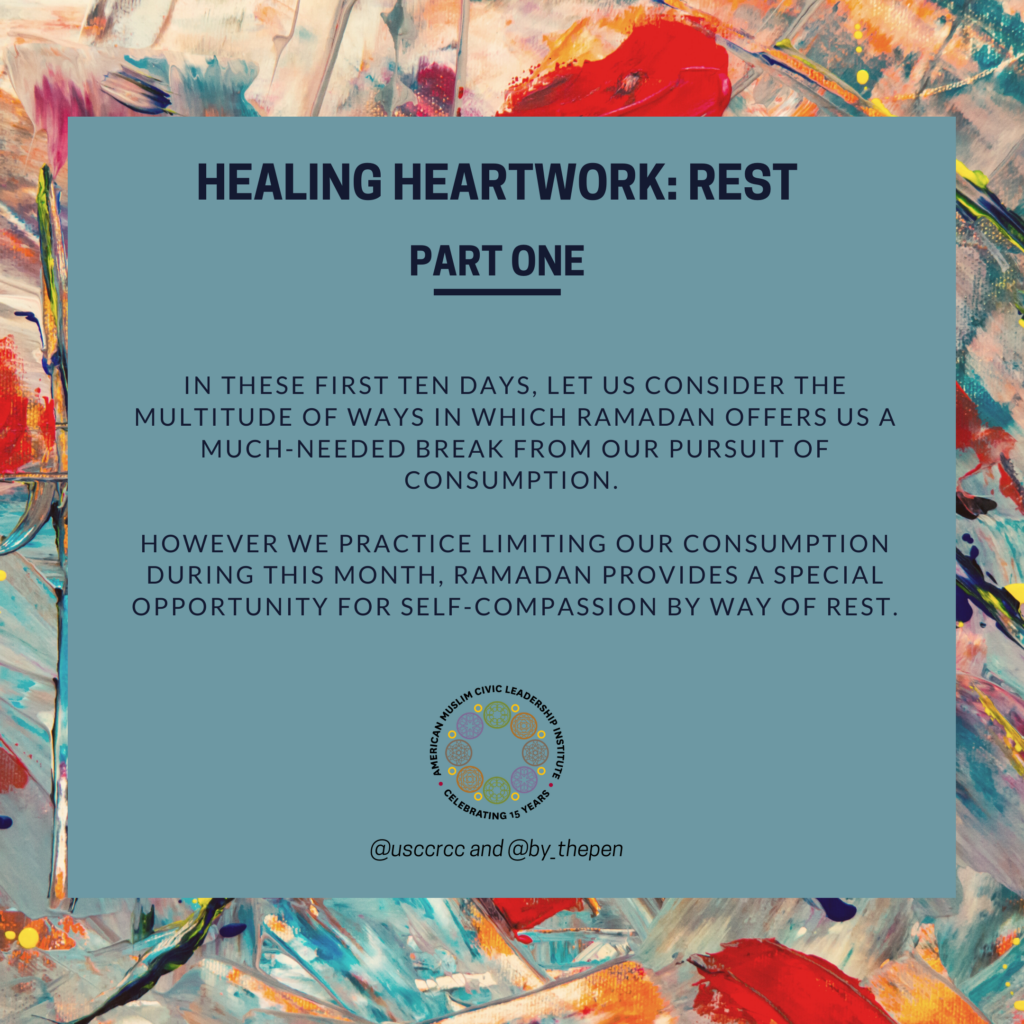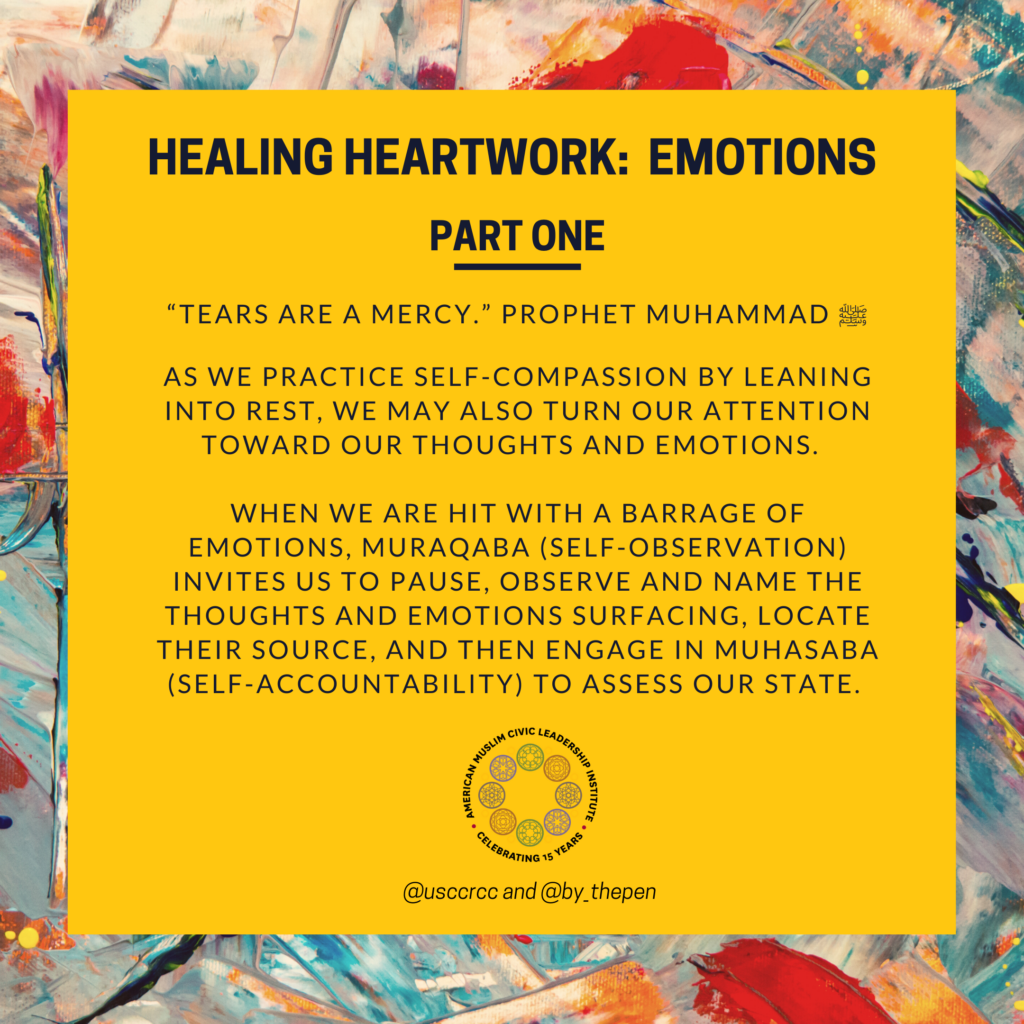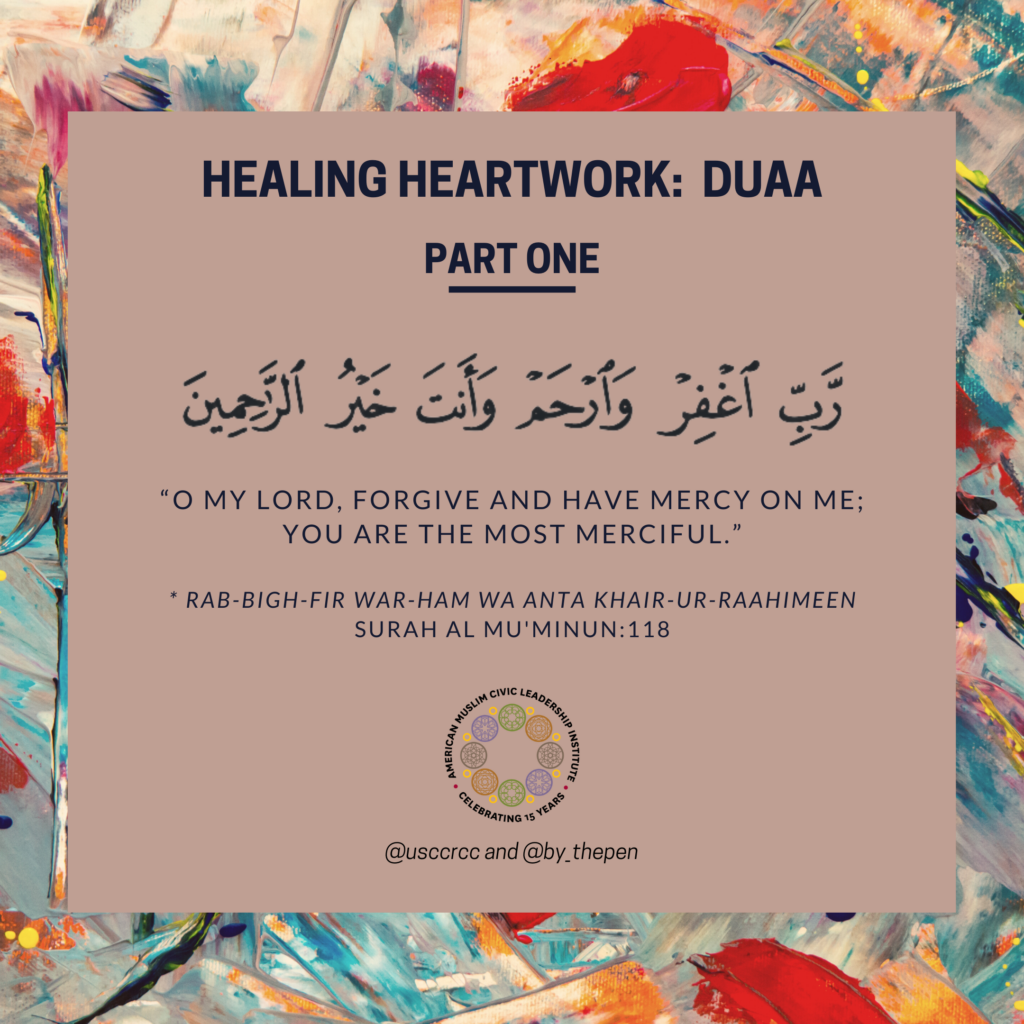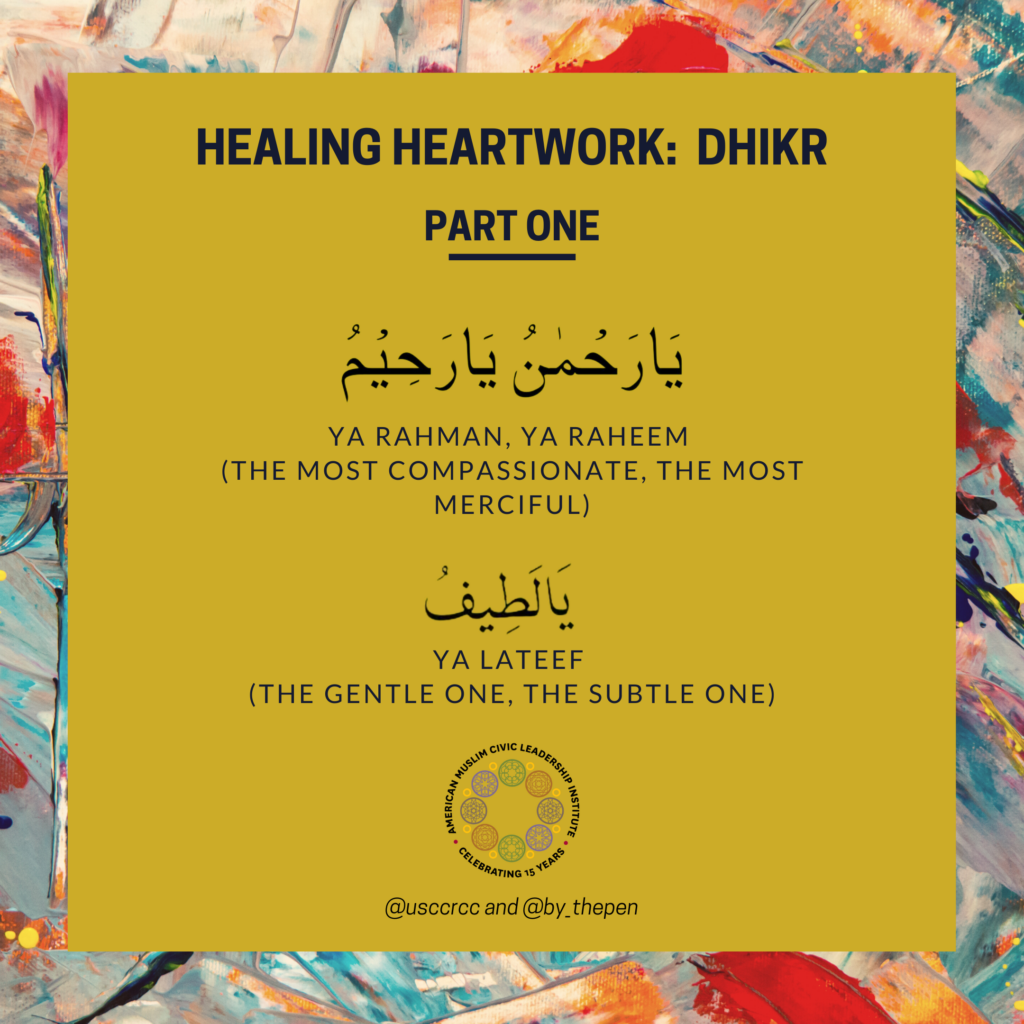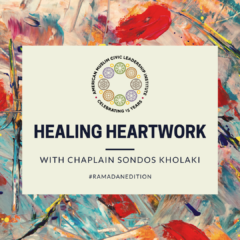Rest: In these first ten days, let us consider the multitude of ways in which Ramadan offers us a much-needed break from our pursuit of consumption.
In the Qur’an, we understand that, as humans, we incline toward haste (21:37) — most days, life seems to manifest as an incessant stream of consecutive appointments with little time for pause. Through an intentional abstention from food and drink and from anything that distracts us from the remembrance and worship of God, Ramadan offers thirty days of conscious pattern-breaking, where we intentionally disrupt our hurried schedules to allow new meanings and spiritual understandings to emerge. Without the annual, welcomed disruption, we may settle deeper into our patterns, habits, and assumptions without creating the rest necessary to consider new ways of being and doing.
However we practice limiting our consumption during this month, Ramadan provides a special opportunity for self-compassion by way of rest. The hunger we experience during fasting serves as a slowing mechanism—without constant fuel from food and drink, we develop an acute awareness of the body wherein we may feel compelled to nap or recline. Rather than fight through our weariness — accumulated over the last eleven months of our daily grind — we may practice self-compassion and mercy by way of rest toward our precious physical form, gifted to us as a beautiful trust (amana) by God so tenderly and intentionally: “We have indeed created humankind in the best of molds” (Qur’an, 95:4). Our beloved Prophet Muhammad ﷺ cultivated healthy sleep habits that Muslims have practiced throughout the centuries, from sleeping soon after Isha prayer and waking with the arrival of Fajr prayer to taking an afternoon nap called a qaylulah after Duhr prayer. Practicing these prophetic sleep habits helps to maintain our energy and overall health, especially during Ramadan. Fasting invites this slowing down the process as we complete a task, take much-needed rest to recoup, and gently move again.
Reflection and retreat offer other forms of rest during Ramadan. While fasting, we may find that our fitra, or natural disposition, recoils from excess noise and mindless consumption and instead craves stillness. Our tradition encourages seclusion in nature, where our fitra and spirit may reconnect to the energy in the earth by sitting directly on the ground, or feel lulled into tranquility by the whispered dhikr of all the organisms, or recapture a primordial humility in the presence of a magnificent sunrise and sunset. This practice of retreat may manifest as simply sitting alone in our backyard or balcony with a string of prayer beads in our hand, or holding nothing at all. When we rest in the midst of the non-anxious energy of the natural world, our dysregulated systems sync to the regulation of Allah’s creation, which soothes us. We may find our capacity for mercy and compassion to all, following in the example of our beloved Prophet ﷺ, restored and replenished in rest and retreat.
Expression: “Tears are a mercy.” – Prophet Muhammad ﷺ
As we practice self-compassion by leaning into rest, we may also turn our attention toward our thoughts and emotions. Every emotion that surfaces plays an important role in alerting us that something is off, sort of like a God-given internal security system. If we distract from, rationalize away, suppress or ignore those inner signals, our bodies will absorb the emotional pain, which eventually manifests in some form of somatic disruption. When we can better understand ourselves–triggers, traumas, and wounds—so grows our understanding of and connection to others. God has ennobled humankind (17:70) with the incredibly unique capacity to both feel and be able to name the feeling (2:31). Whether during the death of his infant son, Ibrahim, or upon hearing especially moving verses of the Qur’an, our beloved Prophet ﷺ expressed his emotions openly and declared his tears as a tender mercy, thereby extending an invitation to all of us to emote as a healing practice.
When we are hit with a barrage of emotions, muraqaba (self-observation) invites us to pause, observe and name the thoughts and emotions surfacing, locate their source, and then engage in muhasaba (self-accountability) to assess our state.
Through this practice, we remain in a compassionate and curious evaluation of our thoughts and emotions. We may ask ourselves questions like, “What am I feeling (name the emotion), and what prompted the emotion? Why am I responding in this way, and is my response informed by my ego or from a sincere, grounded place? What remains raw or unhealed within me, still? Which voice emerged for me at that moment — my lower self or my higher self?”
Once discerned, we may choose to speak to a trusted friend or counselor about the thought and subsequent emotion, evaluate our need for pause and rest and practice engaging in dhikr (prayerful mantras) and duaa (supplication) — in essence, shifting our focus back to Allah and reminding our heart that we are not alone on our journey but that the Perfect Companion and Friend accompanies us throughout. In the Islamic tradition, this practice of muraqaba and muhasaba captures the real meaning of mindfulness and meditation. When we can begin to recognize our lower self dictating unhelpful thoughts and motives, only then can we begin the difficult and relentless work of refining our nafs, or ego, through dhikr remembrance, prayer, and repentance such that our every thought, word, and action begins to reflect the beauty and mercy of the Divine.
Suggested duaa for these first ten days:
“O my Lord, forgive and have mercy on me; You are the Most Merciful.”
* Rab-bigh-fir war-ham wa Anta Khair-ur-Raahimeen. (Surah Al Muminun:118)
Suggested dhikr* for these first ten days:
Ya Rahman, Ya Raheem (The Most Compassionate, the Most Merciful)
Ya Lateef (The Gentle One, the Subtle One)
*Note on dhikr:
One may engage in dhikr using prayer beads to keep track, generally counting 33 or 99 beads. Additionally, our beloved Prophet ﷺ taught us how to use our fingers to keep track, notably through the use of tapping the thumb at certain points on our fingers, thereby emulating tapping therapy known as EFT, which creates balance in the body’s energy to control stress. Using either of these forms of dhikr, combined with the metaphysical power of the words and phrases taught to us by the beloved Prophet ﷺ, result in incredible stress relief and inner tranquility (13:28).
In Islam, healing is literally at our fingertips.
To download the full infographic for Part One: Mercy and Compassion, click below:
The Healing Heartwork Toolkit is a collaboration between AMCLI and Chaplain Sondos Kholaki.
Chaplain Sondos Kholaki is an AMCLI fellow and guest contributor with the USC Center for Religion and Civic Culture.

